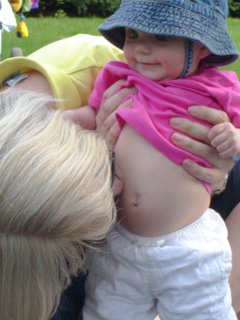**Edited – link added – below. Check it.
What follows is an exchange that was, with the exception of the last letter (my last, unpublished word), recently printed in the National Post. And, for dessert, random thoughts that may or may not be related to that exchange.
(And! Gratuitous baby photos!)

What’s Best for Mom is What’s Best for Kids
Re: Stay At Home, Mom!, April 26.
Caitlin Flanagan states that she “said the truth” in her book, To Hell with All That: Fearing and Loathing Our Inner Housewife, in suggesting that stay-at-home motherhood is best for children and families. She also responds to critics who charge that the book is a contradiction in terms (in its having been written by a working mother) by saying that “it’s a book about contradictions.”
A memo to Ms. Flanagan: You can’t have it both ways. When your operating assumptions are riddled with contradictions, you cannot claim that your conclusions are “truth.” What you have are opinions.
And while her opinion that stay-at-home motherhood is best seems commonsensical, it misses the point for most mothers. What’s best for children and families is what’s best for women — as mothers and as individuals — and that’s choice. A woman who finds staying at home fulfilling and rewarding will be a happy woman and so will be giving her best to her children. A woman who finds staying at home stifling or frustrating is going to be unhappy: Is this best for her children? The gold standard is happy parents.
Ms. Flanagan says that “when a mother works, something is lost.” Absolutely. But something is also lost when a mother stays home and is miserable, or when a father works such long hours that he only sees his children on weekends. The happiest families are those in which both parents are able to make the choices that best serve them and their children, not those that follow the dubious “truths” of a dilettante stay-at-home-mom like Ms. Flanagan.
Her Bad Mother, Toronto
Re: What’s Best For Mom Is What’s Best For Kids, letter to the editor, April 28.
(Her Bad Mother’s) letter saddens and frightens me. She states: “A woman who finds staying at home stifling or frustrating is going to be unhappy. Is this best for her children? The gold standard is happy parents.”
Shouldn’t the “gold standard” be happy and healthy children? It is this type of selfish attitude that causes many parents to feel the “need” for a dual income and therefore leave the child-rearing to strangers or grandparents, even if they don’t need the extra money. I realize many couples require both parents to work in order to pay the bills, but Ms. Bad Mother is talking about working for the purpose of being a “happy parent” — not because of a need for money. Perhaps we need to ask ourselves why we have children. Is it to fulfill ourselves and to make us happy as parents? It should be about the children. They should come first.
Paul Larman, Barrie, Ont.
Put Family First
Re: Put Children First, Letter to the Editor
Paul Larman missed or misunderstood my point entirely. I did not say that parents should go to work ‘for the purpose of being a ‘happy parent’’ (italics mine); I said that the happiness of parents should be a consideration in making the choices that make a happy family. If a mother – or, for that matter, a father – is happy staying at home, then that happiness will be reflected in her or his parenting, and consequently yield greater happiness for the children. The well-being and happiness of our children is, of course, the primary concern here; what I’m suggesting is that the well-being and happiness of men and women as parents has everything to do with the happiness of their children.
 So when I said that ‘the gold standard is happy parents,’ I was referring to a standard against that suggested by Caitlin Flanagan – the standard of the dutiful stay-at-home mother/housewife. The gold standard of parenting is not – cannot be – such a model, which is unattainable for many and undesirable for many. Where this model is possible and desirable – as it is for myself and my own family – it can be understood to be meaningfully choiceworthy. Where such a choice is not solely a matter of duty, it serves the greater happiness of the family as a whole. However, where this model is pursued only as a matter of duty, and where the primary duty within that models falls to a reluctant mother, whose interests are really served? The children will certainly benefit from the ’round-the-clock presence of their mother, but if she is unhappy, how deep does that benefit actually run?
So when I said that ‘the gold standard is happy parents,’ I was referring to a standard against that suggested by Caitlin Flanagan – the standard of the dutiful stay-at-home mother/housewife. The gold standard of parenting is not – cannot be – such a model, which is unattainable for many and undesirable for many. Where this model is possible and desirable – as it is for myself and my own family – it can be understood to be meaningfully choiceworthy. Where such a choice is not solely a matter of duty, it serves the greater happiness of the family as a whole. However, where this model is pursued only as a matter of duty, and where the primary duty within that models falls to a reluctant mother, whose interests are really served? The children will certainly benefit from the ’round-the-clock presence of their mother, but if she is unhappy, how deep does that benefit actually run?
This is old feminist hat, but why should the woman be the one to stay home if she would rather work? Or, to put it differently, why should the father work, if he would rather stay home? My point is that mothers and fathers – families – are best served by choices. Obviously, financial constraints bear upon the availability of such choices, and ours would be a much better world for families if all had the financial freedom to choose to keep a parent at home. But perfectionist claptrap such as that which Ms. Flanagan is offering and Mr. Larman defending – the insistence that the only happy family is one that follows the Cleaver model of virtuous stay-at-home housewifeliness – also constrains families and women by perpetuating the dangerous myth that parenting, and motherhood in particular, must for some reason be sacrificial. Happy families are only happy families to the extent that all members – children, fathers, and mothers – are happy. Period.
Her Baaaaad Mother, Toronto
For the record, I enjoy Caitlin Flanagan’s writing: she’s funny, and smart, and she raises interesting and provocative questions. As should be obvious from the above exchange, I disagree with many of her conclusions. But that disagreement is not what is really getting under my skin here. What most bothers me is that this work contributes in a significant way to the manufacture of polarities in the debates concerning women, motherhood and parenting. It seems that almost everything being published these days on the topics of feminism and motherhood and the confluence of these is or is being presented as an extreme pole in a raging debate. Moms versus Mommies! SAHM versus WOHM! Feminist versus Traditionalist versus post-Feminist! KoolAid quaffers versus cold realists! Flanagan’s book is just adding height and prominence to the already teetering New Traditionalist/Post-Feminist pole and so making discussion among women about their condition as women and mothers seem all the more, well, polarized.
Of these poles, of course, everybody loves the one that is or seems to be anti-feminist (as the New Traditionalist/Post-Feminist camps appear to be), the one that seems to break through the seeming din of feminist dogma, the blind chorus of we-are-women-hear-us-roar-our-weakness. Because that’s edgy. That’s brave. That’s daring.
(There’s a Nietzschean rant here that I am fighting off with all that I have… resist resist resist…)
Lone woman setting out to battle the feminist lions?
That’s a story.
Controversy sells, obviously, and so it’s likely no accident that any mention of Flanagan’s book is prefaced by taglines to the effect of “Feminist Rage Boils Over!” Find or create the Anne Coulter of mothers and you’ll have your next media sensation. But all of the fuss over what is ostensibly polarized and sensational obscures the fact that between and amongst women there is a fluid range of positions and views and that for most thinking women – for this woman – those positions and views are threaded with ambivalence and ambiguity and and contradiction and nuance. I call myself a mommy, but appreciate the force of the argument for using ‘mom’ or ‘mother.’ I call myself a feminist, but have had my struggles with feminism in both theory and practice. I am a SAHM who never thought that she would be a SAHM and that she would love being a SAHM; I am also a SAHM who needs the stimulation of things beyond my SAHMness. (Queen of Spain put wonderful words to this, chez QOS today: I am a stay-at-home-FEMINIST.)
We contradict ourselves? Fine, we contradict ourselves; we are vast, we can contain multitudes.
It’s not controversial, it’s not edgy. But it’s probably the most interesting thing about being a woman, a mother, a parent, a human being.
Let’s embrace it.

What is truly unambiguous, unambivalent, and without contradiction: The Zurbert.

